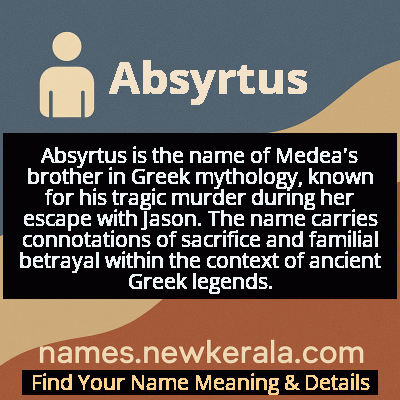Absyrtus Name Meaning & Details
Origin, Popularity, Numerology Analysis & Name Meaning of Absyrtus
Discover the origin, meaning, and cultural significance of the name ABSYRTUS. Delve into its historical roots and explore the lasting impact it has had on communities and traditions.
Name
Absyrtus
Gender
Male
Origin
Greek
Lucky Number
8
Meaning of the Name - Absyrtus
Absyrtus is the name of Medea's brother in Greek mythology, known for his tragic murder during her escape with Jason. The name carries connotations of sacrifice and familial betrayal within the context of ancient Greek legends.
Absyrtus - Complete Numerology Analysis
Your Numerology Number
Based on Pythagorean Numerology System
Ruling Planet
Saturn
Positive Nature
Ambitious, efficient, realistic, and authoritative.
Negative Traits
Materialistic, stressed, confrontational, and can be overly ambitious.
Lucky Colours
Dark blue, black.
Lucky Days
Saturday.
Lucky Stones
Blue sapphire, amethyst.
Harmony Numbers
2, 4, 6.
Best Suited Professions
Business leaders, managers, financial services, law enforcement.
What People Like About You
Leadership, determination, organizational skills.
Famous People Named Absyrtus
Absyrtus of Colchis
Mythological Prince
Central figure in the Medea myth whose murder became pivotal to the Argonaut legend
Absyrtus (Literary Character)
Tragic Figure
Subject of multiple classical tragedies exploring themes of betrayal and sacrifice
Absyrtus (Academic Subject)
Mythological Reference
Frequently studied in classical mythology and Medea narrative analysis
Name Variations & International Equivalents
Click on blue names to explore their detailed meanings. Gray names with will be available soon.
Cultural & Historical Significance
Throughout Western literary tradition, the figure of Absyrtus has influenced countless adaptations and reinterpretations of the Medea story. From ancient Greek theater to modern psychological dramas, his character continues to symbolize the innocent victim caught in conflicts beyond his control. The cultural significance extends beyond mere mythology into discussions about loyalty, sacrifice, and the price of ambition. His story raises enduring questions about the limits of familial obligation and the tragic outcomes when personal desires override traditional bonds, making him a timeless figure in the exploration of human morality and emotional extremes.
Extended Personality Analysis
Though ancient sources provide limited direct characterization of Absyrtus, his mythological role suggests several interpretable personality traits. He is typically portrayed as young and trusting, displaying the innocence and vulnerability that make his murder particularly tragic. His position as the brother who accompanies Medea suggests either a protective nature or a trusting relationship with his sister, qualities that ultimately lead to his downfall. The narrative implies he embodied traditional royal virtues of loyalty to his father and kingdom, making him an unwitting obstacle to his sister's desperate plans.
Modern psychological interpretations of Absyrtus often emphasize his role as a sacrificial figure, suggesting qualities of unintended martyrdom and the representation of collateral damage in familial conflicts. His story invites analysis of how innocence can be destroyed by the ambitions and passions of others, positioning him as a symbol of trust betrayed. The circumstances of his death—being murdered by his own sister—paint him as fundamentally good-natured and unsuspecting, characteristics that heighten the tragedy of his fate. These interpretative traits continue to make him a compelling subject for literary and psychological analysis of ancient mythological characters.
Modern Usage & Popularity
In contemporary times, the name Absyrtus remains exceptionally rare and is primarily confined to academic, literary, and mythological contexts. It has never gained mainstream popularity as a given name, largely due to its association with a violent mythological death and the tragic nature of its bearer's story. Modern usage is typically limited to classical studies, artistic works exploring Greek themes, and occasionally as an unconventional choice by parents with deep interest in mythology who appreciate its historical significance and distinctive sound. The name's extreme rarity and strong mythological connections make it appealing primarily to those seeking unique classical names with dramatic narrative weight, though its dark connotations continue to limit its widespread adoption.
Symbolic & Spiritual Meanings
Symbolically, Absyrtus represents the ultimate sacrificial victim and the tragic fragmentation of familial unity. His dismemberment and the scattering of his body parts serve as powerful metaphors for the breaking of family bonds and the destruction of innocence by overwhelming passions. The name evokes themes of collateral damage in personal conflicts, the price paid for others' ambitions, and how traditional loyalties can be shattered by new allegiances. In broader interpretation, Absyrtus symbolizes the innocent destroyed by circumstances beyond their control, serving as an archetype of the victim whose fate is determined by the actions and desires of more powerful figures. His story continues to resonate as a cautionary tale about the devastating consequences when personal obsessions override fundamental human connections and moral boundaries.

